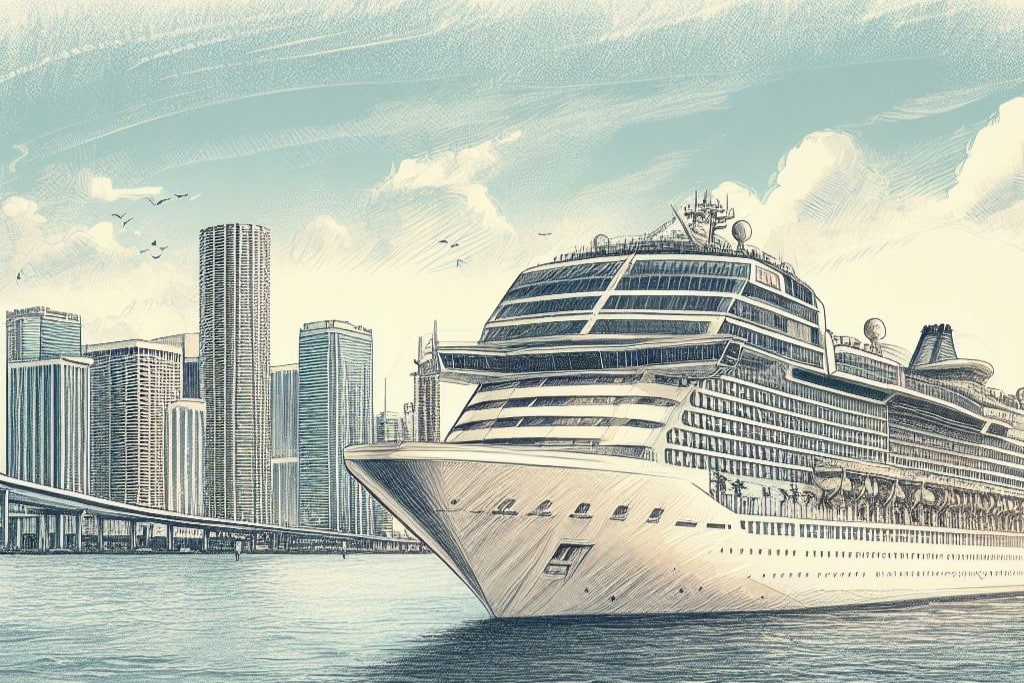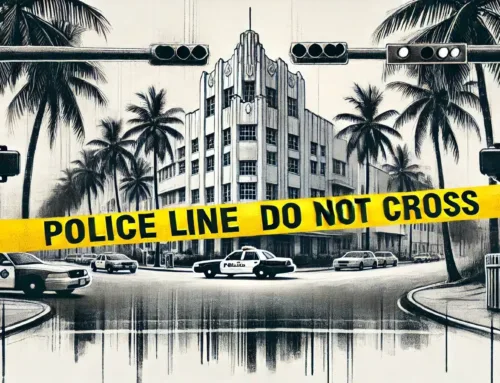Who Has Jurisdiction When a Crime is Committed on a Cruise Ship?
While most people embark on cruises to escape the daily grind and indulge in a slice of paradise, the unfortunate reality is that crimes can and do happen on the high seas. Cruise ships frequent the port of Miami and embark on tropical getaways through international waters. But if a crime happens on the high seas, how is it prosecuted? Which country’s laws apply? And who has the authority to investigate, charge, and try suspects? These are all critical questions for the accused and victims alike.
How Criminal Jurisdiction Works on Cruise Ships
Cruise ships occupy a gray area legally. They are vessels registered (or “flagged”) in one country, owned by a company headquartered in another country, traveling through international waters with crew and passengers from many nations. When a crime occurs aboard, more than one country may have an interest in exerting authority.
Several factors determine which country has jurisdiction:
- Ship’s Flag State: The country where the ship is registered has jurisdiction over administrative issues like safety, maintenance, and labor issues. This is called the ship’s “flag state.” Around three-quarters of cruise ships frequenting Miami are registered in the Bahamas, Panama, or Malta.
- Cruise Line’s Base Country: The country where the cruise line’s corporate headquarters is located may claim jurisdiction to investigate crimes on its ships. For example, Royal Caribbean is based in Miami so the US would have interest.
- Ship’s Location: If a crime happens while the ship is docked at a port, the country where the port is located has jurisdiction. Crimes on the high seas fall under the flag state’s jurisdiction.
- Citizenship of Parties Involved: The nationality of the victim and accused can determine jurisdiction. Countries have a specific interest in handling crimes when their citizens are involved.
This overlapping web means multiple countries may see the crime as falling under their authority. Who takes the lead will depend on the specific circumstances.
Florida’s Special Maritime Jurisdiction
Florida has codified a specific statute, 910.006, that defines the state’s “special maritime criminal jurisdiction” over certain crimes that occur on cruise ships, even in international waters. This law was enacted because major cruise ships frequent Florida ports, so the state has a vested interest in regulating criminal activity that affects residents.
The statute outlines several situations where Florida can prosecute crimes that occur on cruise ships outside of territorial waters:
- If the victim or defendant is a Florida resident
- If the ship’s master or flag state relinquishes custody of a suspect to Florida law enforcement
- If most passengers embarked in Florida
- If the victim is a Florida law enforcement officer
- If it is a violent crime against a Florida resident
This means Florida can prosecute these crimes under state laws, even if international maritime law might otherwise assign jurisdiction elsewhere. The law includes limitations to avoid conflicts with federal or international jurisdiction. But it provides a tool for Florida to prosecute cruise ship crimes against residents.
Which Law Enforcement Investigates Crimes at Sea?
While complex, some general rules apply when determining which law enforcement agency takes charge of investigating a cruise ship crime:
- Flag State: The flag state has primary authority to investigate crimes on ships flagged there. For example, the Bahamas would take the lead on ships registered in Nassau.
- Port State: If a ship is docked when the crime occurs, local police will likely board and conduct an initial investigation and evidence collection. They may transfer responsibility to another agency later.
- FBI: The FBI has broad extraterritorial jurisdiction over American citizens and can assert authority to investigate crimes against Americans aboard cruises anywhere. They often get involved in cruise ship crime investigations.
- Coast Guard: The US Coast Guard has law enforcement powers in maritime regions near US shores. They may board ships docked at US ports if federal crimes are suspected.
- Private Ship Security: Cruise ships have internal security forces that first respond to any crime reports on board. They will alert the proper authorities.
Jurisdiction issues are usually worked out cooperatively between law enforcement agencies. The local police who respond first will reach out to federal and international counterparts and decide how to share responsibility.
How Are Crimes at Sea Prosecuted? Which Laws Apply?
Once an investigation determines suspects and gathers evidence, the next question is – where will formal charges be filed? And whose laws will be applied?
- Flag State’s Laws: The flag state’s criminal code governs aboard ships flagged there. Very serious crimes like homicide may be automatically considered under that country’s laws regardless of victim or suspect nationality.
- Base Country’s Laws: The cruise line’s base country may seek to prosecute under its own laws, especially if citizens are involved as victims or accused.
- Port State’s Laws: Some countries claim jurisdiction over all crimes committed in their territorial waters, extending that authority over docked foreign-flagged ships.
- Special Maritime Laws: If the crime occurred in international waters, specialized maritime laws may come into play. These laws allow any country to prosecute if evidence supports it.
- Extradition: To prosecute a foreign suspect, the receiving country may negotiate their extradition from their home country or the cruise line’s base country.
In practice, jurisdiction usually goes to the country with the strongest connection to the crime through citizenship of involved parties or location. Courts in that country will apply their own laws in prosecution.
It’s complex, but these rules allow fair prosecution in the place with the greatest interest. It prevents criminals from slipping through the cracks by committing crimes in international waters.
Can You Be Prosecuted in the United States for Crimes on Cruise Ships?
For cruises that embark and disembark from U.S. ports like Miami, suspects may face prosecution in the United States under some circumstances.
There are a few ways jurisdiction can be asserted in U.S. courts:
- Crime Against U.S. National: If the victim is an American citizen, the FBI can investigate, and courts can prosecute, regardless of where the ship was located at the time.
- Crime in U.S. Waters: If a ship is docked at or traveling within three nautical miles of the U.S. coast, courts have jurisdiction over crimes committed there.
- Crime on U.S. Company’s Ship: Since major cruise lines like Carnival and Royal Caribbean are U.S. companies, their ships are subject to U.S. laws and courts can prosecute crimes aboard them.
- Suspect is American: If the accused is a U.S. citizen, they may be prosecuted upon returning to the U.S. even for crimes abroad under extraterritorial jurisdiction.
- Extradition: If another country is handling the case, the U.S. may negotiate to extradite American citizen suspects back home for prosecution.
The FBI has a cruise ship crime unit with agents trained to respond to ships docking in U.S. ports. They frequently get involved in major crime investigations at sea.
Facing Prosecution? How a Miami Criminal Defense Attorney Can Help
If you’re facing charges for an alleged crime on a cruise ship, it’s vital to engage an experienced criminal defense attorney immediately. Don’t say anything to authorities without counsel present.
A lawyer can help by:
- Pinning Down Jurisdiction: Determining which country is prosecuting and under what laws is crucial. Different laws have different defenses available.
- Reviewing Evidence: We can examine the evidence gathered by authorities to identify holes or procedures done improperly. Physical evidence from crime scenes at sea can sometimes be mishandled.
- Negotiating with Prosecutors: We may be able to negotiate with prosecutors to limit charges or agree to a plea deal. This is dependent on the jurisdiction prosecuting.
- Navigating Extradition: If the U.S. is seeking extradition from another country, we can argue against it and avoid prosecution here.
- Advocating for You: At trial or sentencing, we build the strongest case to avoid conviction or minimize penalties. Unique circumstances of maritime crimes can be leveraged.
Don’t go it alone if questioned or charged over a cruise ship crime. With skills in both U.S. and maritime law, an experienced Miami criminal attorney can defend your rights every step of the way.
CALL US NOW for a CONFIDENTIAL INITIAL CONSULTATION at (305) 538-4545, or take a moment to fill out our confidential and secure intake form.* The additional details you provide will greatly assist us in responding to your inquiry.
THERE ARE THOUSANDS OF LAW FIRMS AND ATTORNEYS IN SOUTH FLORIDA. ALWAYS INVESTIGATE A LAWYER’S QUALIFICATIONS AND EXPERIENCE BEFORE MAKING A DECISION ON HIRING A CRIMINAL DEFENSE ATTORNEY ATTORNEY FOR YOUR MIAMI-DADE COUNTY CASE








